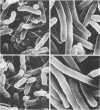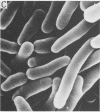Abstract
The effects of Tween 80 supplementation of liquid culture medium on the formation of the superficial L1 layer of the Mycobacterium avium-Mycobacterium intracellulare complex (MAC) were examined by serological and scanning electron microscopic experiments. Specific antiserum to the glycopeptidolipids on the L1 layer of M. avium S-139, made in a rabbit, was used for seroagglutination reactions with antigens prepared from strain S-139 grown in medium supplemented with various levels of Tween 80 (0, 0.05, 0.5, 5, and 50 mg/ml). The agglutination titers gradually decreased as the concentration of Tween 80 rose. Scanning electron microscopy showed that the fibrillar materials consisting mainly of glycopeptidolipids on the L1 layer of strain S-139 also disappeared with increases in the concentration of Tween 80. In addition, there was no obvious correlation between (i) the plasmid DNAs and serotypes of MAC and (ii) formation of the L1 layer of MAC. It is therefore concluded that Tween 80 used to supplement liquid culture medium affects formation of the L1 layer, which has been considered to be one of the pathogenic factors of MAC.
Full text
PDF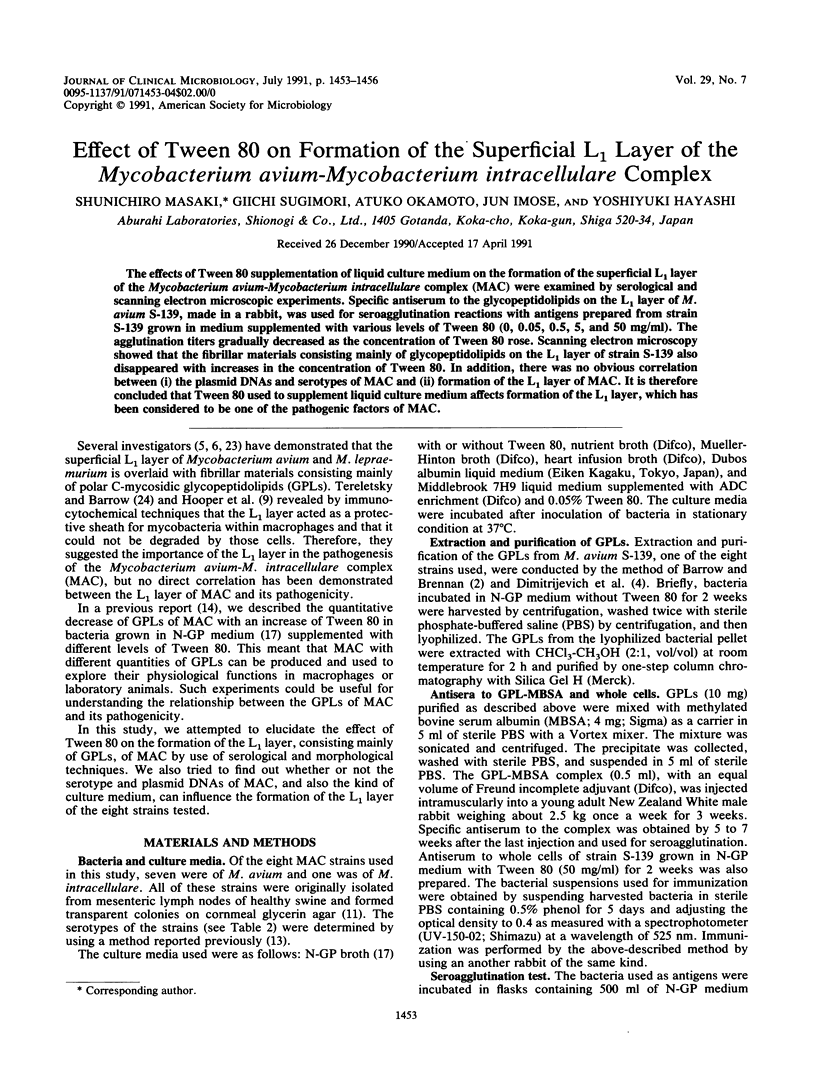
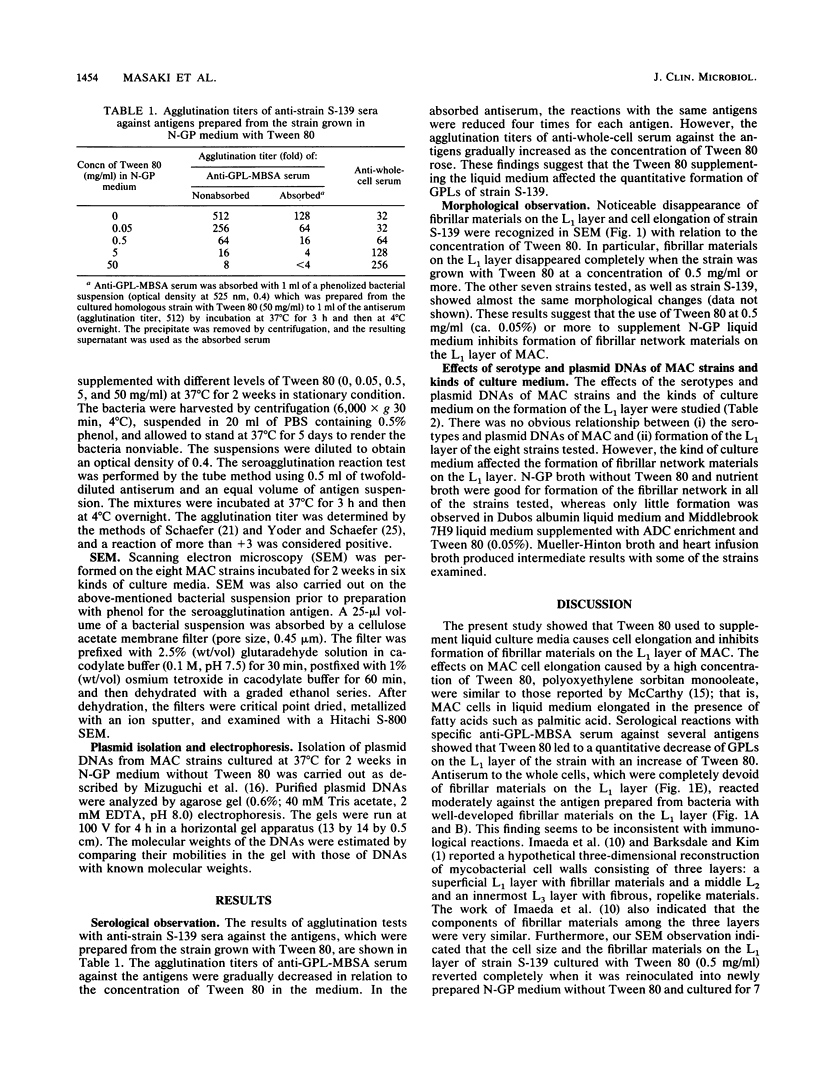
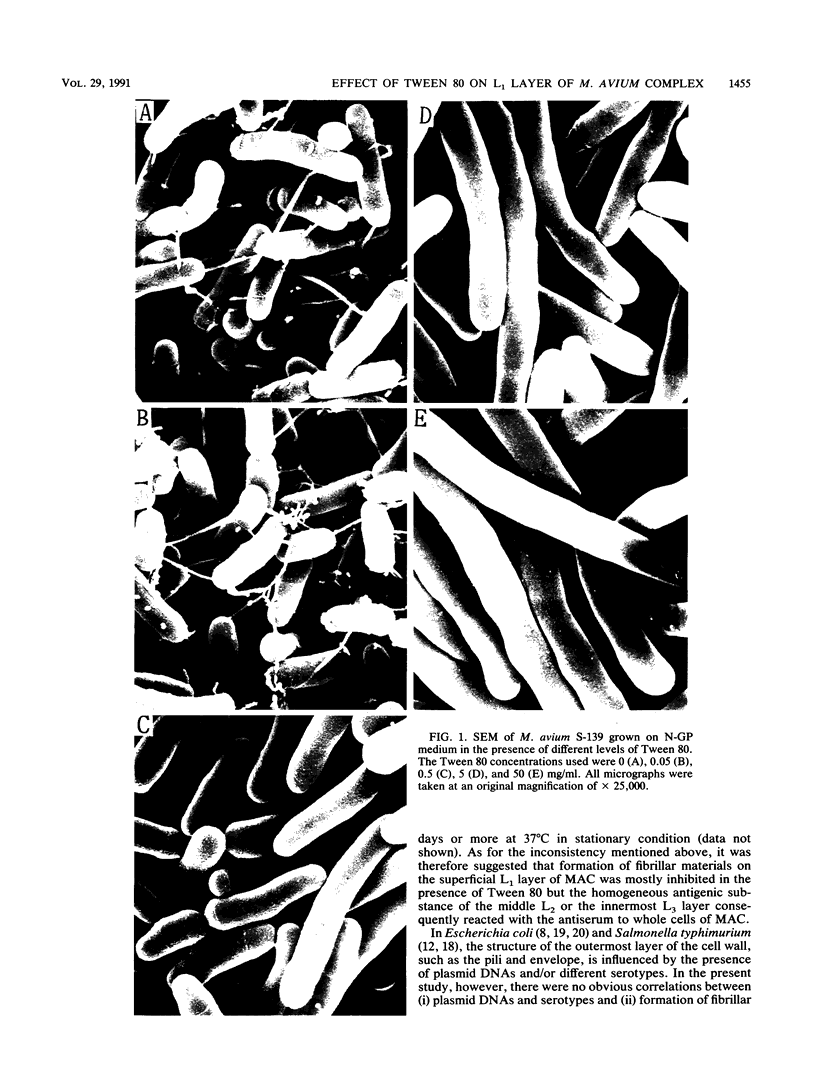
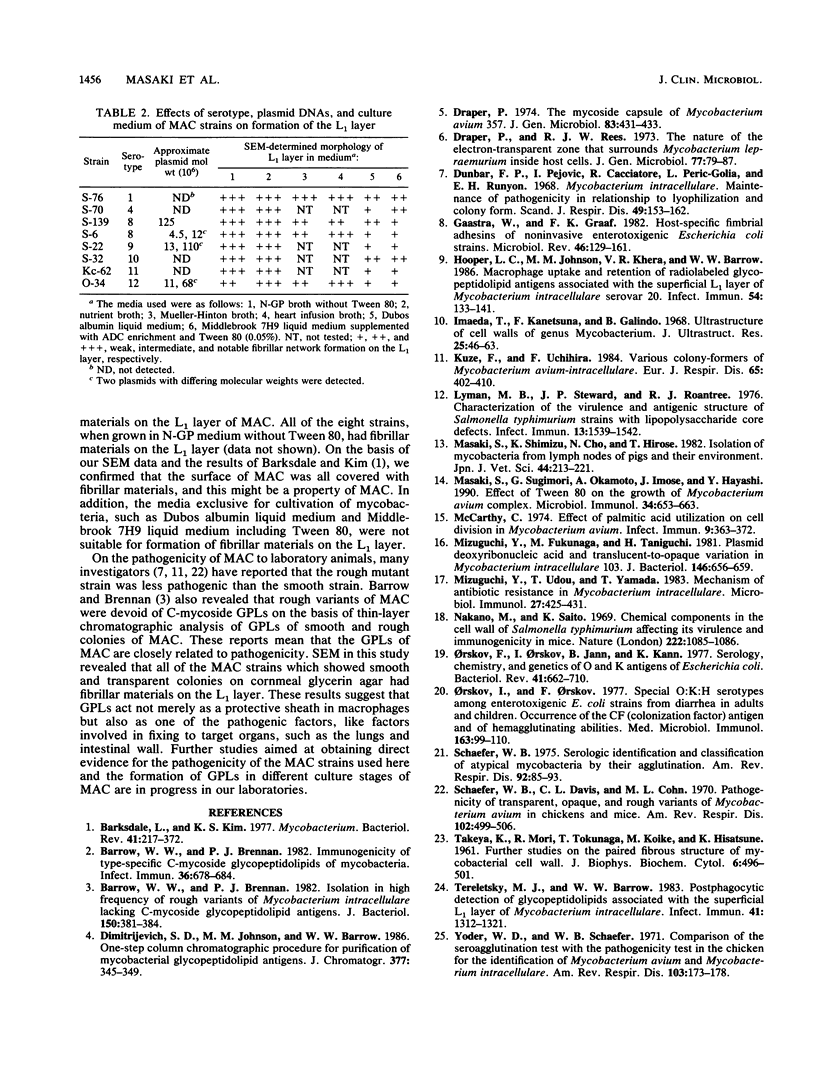
Images in this article
Selected References
These references are in PubMed. This may not be the complete list of references from this article.
- Barksdale L., Kim K. S. Mycobacterium. Bacteriol Rev. 1977 Mar;41(1):217–372. doi: 10.1128/br.41.1.217-372.1977. [DOI] [PMC free article] [PubMed] [Google Scholar]
- Barrow W. W., Brennan P. J. Immunogenicity of type-specific C-mycoside glycopeptidolipids of mycobacteria. Infect Immun. 1982 May;36(2):678–684. doi: 10.1128/iai.36.2.678-684.1982. [DOI] [PMC free article] [PubMed] [Google Scholar]
- Barrow W. W., Brennan P. J. Isolation in high frequency of rough variants of Mycobacterium intracellulare lacking C-mycoside glycopeptidolipid antigens. J Bacteriol. 1982 Apr;150(1):381–384. doi: 10.1128/jb.150.1.381-384.1982. [DOI] [PMC free article] [PubMed] [Google Scholar]
- Dimitrijevich S. D., Johnson M. M., Barrow W. W. One-step column chromatographic procedure for purification of mycobacterial glycopeptidolipid antigens. J Chromatogr. 1986 Apr 25;377:345–349. doi: 10.1016/s0378-4347(00)80791-4. [DOI] [PubMed] [Google Scholar]
- Draper P., Rees R. J. The nature of the electron-transparent zone that surrounds Mycobacterium lepraemurium inside host cells. J Gen Microbiol. 1973 Jul;77(1):79–87. doi: 10.1099/00221287-77-1-79. [DOI] [PubMed] [Google Scholar]
- Draper P. The mycoside capsule of Mycobacterium Avium 357. J Gen Microbiol. 1974 Aug;83(2):431–433. doi: 10.1099/00221287-83-2-431. [DOI] [PubMed] [Google Scholar]
- Dunbar F. P., Pejovic I., Cacciatore R., Peric-Golia L., Runyon E. H. Mycobacterium intracellulare. Maintenance of pathogenicity in relationship to lyophilization and colony form. Scand J Respir Dis. 1968;49(2):153–162. [PubMed] [Google Scholar]
- Gaastra W., de Graaf F. K. Host-specific fimbrial adhesins of noninvasive enterotoxigenic Escherichia coli strains. Microbiol Rev. 1982 Jun;46(2):129–161. doi: 10.1128/mr.46.2.129-161.1982. [DOI] [PMC free article] [PubMed] [Google Scholar]
- Hooper L. C., Johnson M. M., Khera V. R., Barrow W. W. Macrophage uptake and retention of radiolabeled glycopeptidolipid antigens associated with the superficial L1 layer of Mycobacterium intracellulare serovar 20. Infect Immun. 1986 Oct;54(1):133–141. doi: 10.1128/iai.54.1.133-141.1986. [DOI] [PMC free article] [PubMed] [Google Scholar]
- Imaeda T., Kanetsuna F., Galindo B. Ultrastructure of cell walls of genus Mycobacterium. J Ultrastruct Res. 1968 Oct;25(1):46–63. doi: 10.1016/s0022-5320(68)80059-0. [DOI] [PubMed] [Google Scholar]
- Kuze F., Uchihira F. Various colony-formers of Mycobacterium avium-intracellulare. Eur J Respir Dis. 1984 Aug;65(6):402–410. [PubMed] [Google Scholar]
- Lyman M. B., Steward J. P., Roantree R. J. Characterization of the virulence and antigenic structure of Salmonella typhimurium strains with lipopolysaccharide core defects. Infect Immun. 1976 Jun;13(6):1539–1542. doi: 10.1128/iai.13.6.1539-1542.1976. [DOI] [PMC free article] [PubMed] [Google Scholar]
- Masaki S., Shimizu K., Cho N., Hirose T. Isolation of mycobacteria from lymph nodes of pigs and their environment. Nihon Juigaku Zasshi. 1982 Apr;44(2):213–221. doi: 10.1292/jvms1939.44.213. [DOI] [PubMed] [Google Scholar]
- Masaki S., Sugimori G., Okamoto A., Imose J., Hayashi Y. Effect of Tween 80 on the growth of Mycobacterium avium complex. Microbiol Immunol. 1990;34(8):653–663. doi: 10.1111/j.1348-0421.1990.tb01041.x. [DOI] [PubMed] [Google Scholar]
- McCarthy C. Effect of palmitic acid utilization on cell division in Mycobacterium avium. Infect Immun. 1974 Feb;9(2):363–372. doi: 10.1128/iai.9.2.363-372.1974. [DOI] [PMC free article] [PubMed] [Google Scholar]
- Mizuguchi Y., Fukunaga M., Taniguchi H. Plasmid deoxyribonucleic acid and translucent-to-opaque variation in Mycobacterium intracellulare 103. J Bacteriol. 1981 May;146(2):656–659. doi: 10.1128/jb.146.2.656-659.1981. [DOI] [PMC free article] [PubMed] [Google Scholar]
- Mizuguchi Y., Udou T., Yamada T. Mechanism of antibiotic resistance in Mycobacterium intracellulare. Microbiol Immunol. 1983;27(5):425–431. doi: 10.1111/j.1348-0421.1983.tb00601.x. [DOI] [PubMed] [Google Scholar]
- Nakano M., Saito K. Chemical components in the cell wall of Salmonella typhimurium affecting its virulence and immunogenicity in mice. Nature. 1969 Jun 14;222(5198):1085–1086. doi: 10.1038/2221085a0. [DOI] [PubMed] [Google Scholar]
- Orskov I., Orskov F., Jann B., Jann K. Serology, chemistry, and genetics of O and K antigens of Escherichia coli. Bacteriol Rev. 1977 Sep;41(3):667–710. doi: 10.1128/br.41.3.667-710.1977. [DOI] [PMC free article] [PubMed] [Google Scholar]
- Orskov I., Orskov F. Special O:K:H serotypes among enterotoxigenic E. coli strains from diarrhea in adults and children. Occurrence of the CF (colonization factor) antigen and of hemagglutinating abilities. Med Microbiol Immunol. 1977 Jul 18;163(2):99–110. doi: 10.1007/BF02121825. [DOI] [PubMed] [Google Scholar]
- Schaefer W. B., Davis C. L., Cohn M. L. Pathogenicity of transparent, opaque, and rough variants of Mycobacterium avium in chickens and mice. Am Rev Respir Dis. 1970 Oct;102(4):499–506. doi: 10.1164/arrd.1970.102.4.499. [DOI] [PubMed] [Google Scholar]
- Schaefer W. B. Serologic identification and classification of the atypical mycobacteria by their agglutination. Am Rev Respir Dis. 1965 Dec;92(6):85–93. doi: 10.1164/arrd.1965.92.6P2.85. [DOI] [PubMed] [Google Scholar]
- TAKEYA K., MORI R., TOKUNAGA T., KOIKE M., HISATSUNE K. Further studies on the paired fibrous structure of mycobacterial cell wall. J Biophys Biochem Cytol. 1961 Feb;9:496–501. doi: 10.1083/jcb.9.2.496. [DOI] [PMC free article] [PubMed] [Google Scholar]
- Tereletsky M. J., Barrow W. W. Postphagocytic detection of glycopeptidolipids associated with the superficial L1 layer of Mycobacterium intracellulare. Infect Immun. 1983 Sep;41(3):1312–1321. doi: 10.1128/iai.41.3.1312-1321.1983. [DOI] [PMC free article] [PubMed] [Google Scholar]
- Yoder W. D., Schaefer W. B. Comparison of the seroagglutination test with the pathogenicity test in the chicken for the identification of Mycobacterium avium and Mycobacterium intracellulare. Am Rev Respir Dis. 1971 Feb;103(2):173–178. doi: 10.1164/arrd.1971.103.2.173. [DOI] [PubMed] [Google Scholar]



